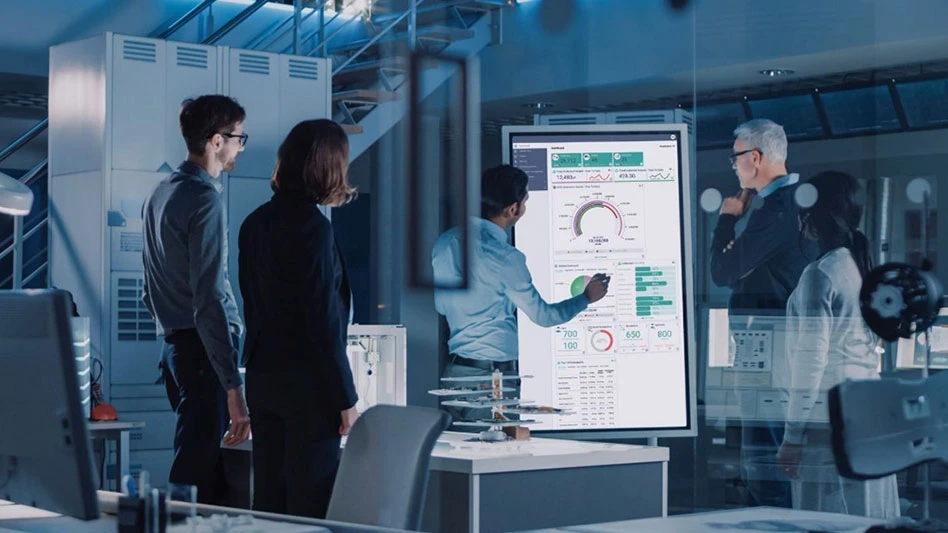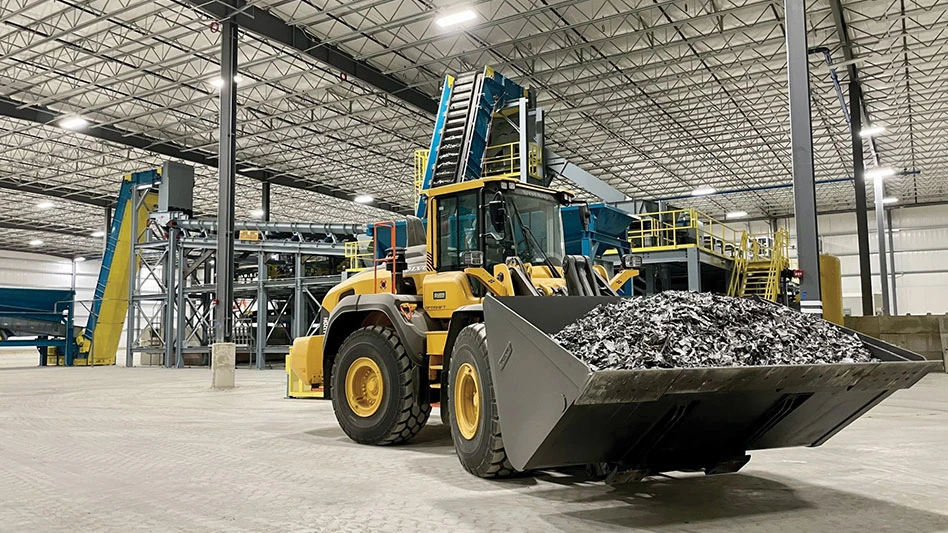
Photo courtesy of Diversys
Are you tired of hearing about the circular economy? We don't blame you. It's easy to get lost in the jargon and technical terms that often surround this buzzword. But don't tune out just yet because a data-driven approach to waste and recycling management is the missing piece of the circular economy puzzle, and it can benefit everyone involved.
At its core, the circular economy is about shifting away from the wasteful linear model of take-make-dispose to a closed-loop system that values resource efficiency and minimizes waste. It's a vision that has the potential to benefit the environment, the economy and society as a whole. But here's the catch: Analysts estimate that less than 10 percent of the global economy is circular. That's a lot of missed opportunity.
Bridging the data gap to speed up the transition to a circular economy
By tracking the flow of materials and resources throughout their entire life cycles, we can identify areas for improvement and innovation, measure the environmental and economic impacts of our production and consumption patterns and validate the shift toward circularity.
But collecting this data is no easy feat. Technical and logistical barriers can make it difficult to ensure the quality and reliability of the data. Sharing data across different sectors and participants makes this even more of a challenge. However, the benefits of data tracking are too significant to ignore. Data can help optimize resource efficiency, reduce waste generation and foster innovation and collaboration by providing insights into the material flows and environmental impacts of different products and services.

In other words, data is not just a tool for monitoring and reporting—it's a driver for change and transformation. The next time someone mentions the circular economy, think about the role of data in making this vision a reality.
The business value of accurate data in waste management and recycling
For the waste and recycling industry, data accuracy means having reliable information about the types, quantities, sources, destinations and costs of waste and recyclables. Data accuracy can benefit waste management and recycling in several ways:
- optimizing waste collection, transportation and processing operations;
- enabling monitoring of waste diversion and recycling rates, enabling better planning and reporting of sustainability goals and performance;
- identifying waste reduction and recycling opportunities, such as finding new markets for recycled materials or implementing waste prevention measures;
- improving compliance with waste management and recycling regulations, such as reporting waste generation and disposal data to authorities or verifying the quality and origin of recycled materials.
These are just some reasons waste management and recycling organizations have started transforming how they track material flows. By automating the data capture process, organizations can reduce the risk of human error and ensure that data is collected consistently across different sites and operations. Accurate data from recycling operations isn’t just good business; good data is necessary to support sustainability initiatives and public policy.
Tracking material flow to meet policy requirements and legislation
As we shift toward a circular economy that prioritizes sustainability and resource efficiency, accurate data on material flows of waste and recyclables are more important than ever. These data are necessary to support public policy and legislation at the local, regional and federal levels to promote sustainable practices and recycling initiatives.
One key policy framework that relies on waste and recyclables data tracking is extended producer responsibility (EPR). Under EPR, producers are required to take responsibility for the end-of-life impacts of their products, including their collection, transportation and processing. This means collecting and reporting data on the types and quantities of materials used in their products, the methods used for processing and disposing of those materials and the amount of waste generated as a result.
But the importance of data doesn't just end with compliance with regulations. Good data can also drive investments into recycling operations at the local and regional levels. By accurately tracking material flows, businesses and policymakers can identify areas where investments in recycling infrastructure are needed most. This, in turn, can lead to job creation, higher recycling rates, reduced waste generation and a healthier environment for everyone.
Accurate data is also necessary to foster stakeholder collaboration in the waste management and recycling system. By sharing data on material flows, producers, recyclers and waste management companies can work together toward common goals and identify opportunities for continuous improvement.
High-quality data on material flows is critical to circular economy initiatives, legislation and public policy. It enables producers to take responsibility for the end-of-life impacts of their products, drives investments into recycling operations, fosters collaboration among stakeholders and ultimately leads to a more sustainable and resource-efficient future.
Challenges in collecting accurate data from recycling
Recycling is a complex process that involves many different people and organizations, each with its own standards and systems for collecting data. Many stakeholders are involved in the recycling value chain, from the waste generators that produce the materials to the collectors, processors, traders and re-manufacturers that handle them. Unfortunately, this poses a challenge when it comes to collecting accurate operational data.
With so many different participants and stakeholders involved, more standardization and consistency in collecting and reporting data is needed. This can make it difficult for waste management and recycling organizations to support their customers' requirements with a complete and accurate picture of the recycling process.
Collecting accurate data from recycling comes with many challenges:
- inconsistent definitions and classifications of recyclable materials and a lack of data collection and reporting standardization;
- unreliable or manual methods and tools for measuring, weighing and recording recyclables, resulting in inaccurate or incomplete data;
- the lack of transparency and traceability in the recycling supply chain makes verifying recycled materials' origin, quality and destination challenging; and
- changing incentives and regulations for data collection and reporting lead to low participation or compliance from some stakeholders.
More information about the top data challenges in recycling program management is available here.
With so many different materials streams, technologies and markets involved, the process is constantly changing and evolving. This means that data collection systems must be flexible and adaptable to keep up with these changes. We can create a more efficient and effective recycling system that benefits everyone involved by addressing the challenges and working towards standardized data collection processes.
How to improve data accuracy in waste management and recycling
As the recycling industry continues to evolve, and integration with the circular economy accelerates, capturing accurate data from recycling programs and operations will be a continued focus.
A variety of techniques can be used:
- establishing standard definitions and classifications of recyclable materials, such as those provided by international standards or industry associations;
- standardizing data capture methodologies using technology and internet of things (IoT) devices, in-field devices and software applications to collect real-time data on waste and recyclable materials;
- eliminating friction for end users such as haulers, operators and technicians, making it easy for them to participate in the data capture process without complicating their workflow.
- implementing data management systems that can store, analyze and audit data from various sources and formats, such as Diversys cloud-based recycling software platforms;
- creating incentives and regulations for data collection and reporting, such as rewarding good practices or imposing penalties for poor ones, as demonstrated by EPR; and
- encouraging collaboration among stakeholders in the waste management and recycling system, including producers, recyclers and waste management companies, to share data and work towards common goals.
The recycling industry requires accurate data to understand how materials flow through the system, identify areas for improvement and ensure compliance with regulations. By leveraging a cloud-based platform for capturing waste and recycling data, participants can create a unified system that supports the unique data and business needs of various recycling operations.
Making it easier to share data and work toward common goals can drive collaboration across industry participants, leading to a more efficient and effective recycling system that benefits everyone involved.
Leveraging data to drive the transition to a circular economy
Data is the missing piece of the circular economy puzzle. However, it is imperative that waste and recycling management organizations put proper systems in place to ensure the quality and accuracy of data capture. By accurately capturing waste and recycling data, industry participants can create a unified system that drives investments, fosters collaboration and, ultimately, leads to a more sustainable and resource-efficient future. The road to a circular economy might still be long, but we can take a step closer to achieving this vision with accurate data as our guide.
The author, a tech-focused digital marketer, is passionate about helping businesses use technology to solve real-world challenges. Her career achievements across ed-tech, cybersecurity and now clean tech highlight her love for education and sustainability. At Diversys, her role is to advance the adoption of sustainable software as a service solutions, helping organizations leverage data to support the circular economy and greater sustainable practices.
Latest from Recycling Today
- Indiana county awarded $65K recycling grant
- Mixed paper, OCC prices end year on downward trend
- Updated: CAA submits final draft program plan in Oregon
- Enviri names new president of Harsco Environmental business
- Survey outlines ‘monumental challenge’ of plastic packaging collection in UK
- Nippon Steel acknowledges delay in US Steel acquisition attempt
- BASF collaborates to study mechanical plastic recycling
- Commentary: navigating shipping regulations for end-of-life and damaged batteries





